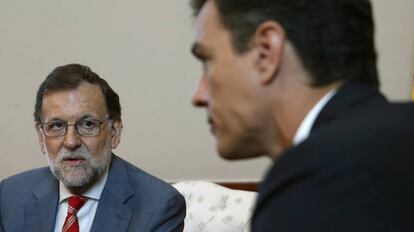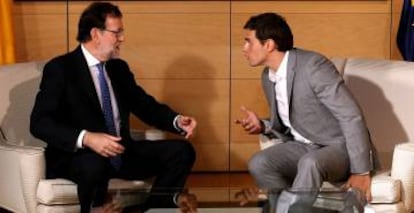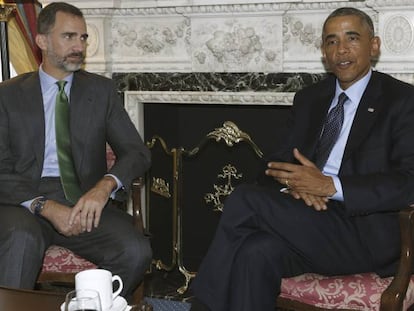Acting PM stays coy about plans to make new leadership bid
Two national elections have come and gone but most parties refuse to budge from their positions, making it possible for Spaniards to have to go to the polls a record third time
Two back-to-back national elections have come and gone, yet most parties refuse to budge from their positions, making it possible for Spaniards to have to go to the polls for a record third time. Mariano Rajoy, who has been in charge of a caretaker administration ever since the original election of December 20, is widely expected to stand for reinstatement. On Wednesday, for the first time, he openly expressed his intention to put himself to a parliamentary vote if King Felipe VI, following legal procedures, formally asks him to try to form a government.

“I have an interest in going to the investiture if His Majesty the King considers it convenient,” said Rajoy, whose Popular Party (PP) earned 137 seats at the June 26 election, up from December but still short of the 176 required for a parliamentary majority.
But later that same day, after spending 80 minutes with Socialist Party (PSOE) leader Pedro Sánchez, Rajoy introduced elements of doubt into his earlier statement: “I have an interest in going and I have an interest in governing. I don’t know whether the others have an interest. I do. But if I had the certainty that it is impossible for me to get voted in, then I would open up a period of reflection and wonder how we are going to find a way out of this.”
If parties once again fail to reach governing deals – or at least secure the promise of an abstention that would enable a candidate to become prime minister in either the first round of the investiture vote or in a run-off – then Spain will be facing the very real possibility of a third national election.
The nationalist connection
The Catalan nationalists of Convergència are asking Socialist leader Pedro Sánchez to take the initiative and try to form an alternative majority of his own. If not, Spain is on its way to third elections, warned the party’s congressional spokesman, Francesc Homs.
Homs did not promise that Convergència would vote for him if he were to stand for the prime minister’s position once again, but he also noted that support for a referendum on independence is no longer a necessary condition. Instead, he asked the PSOE to accept the creation of a congressional committee to analyze the referendum issue.
Meanwhile, the Basque Nationalist Party (PNV) said on Wednesday that it would make no sense for the Socialists to block a Rajoy government if the Socialist nominee does not have an alternative of his own.
"That would really take us to third elections, which would leave the country's image at the level of mud," said PNV congressional spokesman Aitor Esteban.
Rajoy said he wants to avoid such a scenario at all costs, because it would be “an absurdity.” He said he would like for Spain’s new executive to be up and running by late July or early August, in order to start working on pressing issues such as the 2017 budget.
But so far, the main opposition Socialists, who have 85 seats in Congress, insist that they will vote against Rajoy if he bids for the post. Walking out of his meeting with Sánchez, Rajoy said that “the essential thing is that he told me he will vote no, and for us to seek agreements with other political forces more similar to ourselves.”
Pedro Sánchez, who himself bid for the prime ministerial position after the first election and was voted down by other forces, held a press conference of his own after his meeting with Rajoy and insisted that the latter may not count on the PSOE to help him into office.
“To this day, the PP has no support of any kind,” he said. “To this day, the PSOE reaffirms that it will vote against Mr Rajoy. He knows that he cannot count on the PSOE for a grand coalition government or to negotiate a legislative program. The PSOE will do exactly the same thing the PP did when it voted against my investiture.”
Some Socialist voices have quietly been suggesting the need for an abstention in order to let the PP form a minority government and pull Spain out of the months-long political deadlock. The latest and most high-profile proponent of this move is Felipe González, Spain’s longest-serving prime minister, who recently published an article in EL PAÍS asking the PSOE not to obstruct a government by the most-voted party.
But so far, Sánchez is not convinced.
“Mr Rajoy needs to find potential allies, and the PSOE is not among these potential allies,” he said on Wednesday. “I reminded him that he no longer has an absolute majority and that he must read the election outcome fully: the PP is the first force in terms of seats, but Spaniards did not give him a large enough majority to govern with just his own program.”
Between a rock and a hard place
Meanwhile, the emerging forces Unidos Podemos (71 seats) and Ciudadanos (32) are doing their own math, and putting pressure on Sánchez to break the impasse.
Podemos leader Pablo Iglesias is asking Sánchez to choose between the right, “which would make him a partner of the PP” or his own Unidos Podemos leftist alliance. “Sánchez must choose between Rajoy, a leftist alternative or third elections.”
“It is up to the PSOE to go to third elections or not. I understand they are under a lot of pressure. I would not want to be in their shoes right now,” said Iglesias on the TV network Antena 3.
But Sánchez has noted that Podemos and the PP “already partnered” when they voted against him at the investiture vote in March.
“There are those who blocked a progressive government of change at the time, but now they are going around giving others lessons,” he said.
Sign up to our newsletter
EL PAÍS English Edition has launched a weekly newsletter. Sign up today to receive a selection of our best stories in your inbox every Saturday morning. For full details about how to subscribe, click here.
When he bid for the position in March, Sánchez had the sole backing of Ciudadanos, whose 40 seats at the time were insufficient to get the Socialist candidate appointed.
On Wednesday, Ciudadanos decided that it will abstain at the run-off of the investiture vote if Rajoy finally opts for the post. This decision breaks with the reform-oriented party’s campaign promise not to help the acting prime minister remain in power because of the PP’s long corruption record.
Ciudadanos leader Albert Rivera is now hoping that the Socialists will abstain as well in order to avoid a third election in Spain. This has now become Rivera’s top priority. “It’s up to the PSOE to make a move now,” he said.

“The Plan B for a minority government by the party that won the election is the only alternative to the current gridlock,” said Rivera. “We will not support or enter into such a government, but we have to choose between the bad and the less bad.”
Rivera also issued a message to other opposition parties. “We all know that we don’t share Rajoy’s government, but Spaniards hope that politicians will provide solutions, not problems.”
English version by Susana Urra.
Tu suscripción se está usando en otro dispositivo
¿Quieres añadir otro usuario a tu suscripción?
Si continúas leyendo en este dispositivo, no se podrá leer en el otro.
FlechaTu suscripción se está usando en otro dispositivo y solo puedes acceder a EL PAÍS desde un dispositivo a la vez.
Si quieres compartir tu cuenta, cambia tu suscripción a la modalidad Premium, así podrás añadir otro usuario. Cada uno accederá con su propia cuenta de email, lo que os permitirá personalizar vuestra experiencia en EL PAÍS.
En el caso de no saber quién está usando tu cuenta, te recomendamos cambiar tu contraseña aquí.
Si decides continuar compartiendo tu cuenta, este mensaje se mostrará en tu dispositivo y en el de la otra persona que está usando tu cuenta de forma indefinida, afectando a tu experiencia de lectura. Puedes consultar aquí los términos y condiciones de la suscripción digital.










































